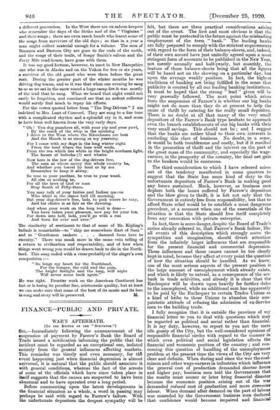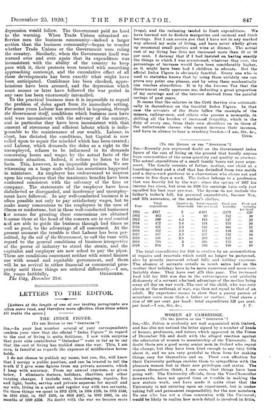FINANCE—PUBLIC AND PRIVATE.
WAR'S AFTERMATH.
[To THE Boma or THE "firrmaroa!9 Six,—Immediately following the announcement of the suspension of payment by Farrow's Bank the Board of Trade issued a notification informing the public that the incident must be regarded as an exceptional one, isolated entirely from the general influences affecting markets. This reminder was timely and even necessary, for tht event happening just when financial depression is almost universal, it is natural that the public should associate it with general conditions, whereas the fact of the arrests of some of the officials which have since taken place in itself suggests that the causes are suspected to have been abnormal and to have operated over a long period.
Before commenting upon the latest developments in the financial situation as a whole, a word in passing may perhaps be said with regard to Farrow's failure. With the unfortunate depositors the deepest sympathy will be
felt, but there are three practical considerations arising out of the event. The first and most obvious is that the public must be protected in the future against the misleading employment of the term " bank." The leading banks are fully prepared to comply with the strictest requirements with regard to the form of their balance-sheets, and, indeed, of their own accord have just unitedly agreed upon a most stringent form of accounts to be published in the New Year, not merely annually and half-yearly, but monthly, the feature of those balance-sheets being that all the figures will be based not on the showing on a particular day, but upon the average weekly position. In fact, the highest traditions of banking are being fulfilled in the sense that publicity is courted by all our leading banking institutions. It must be hoped that the strong " lead ' given will be very generally followed. The next point which arises from the suspension of Farrow's is whether our big banks might not do more than they do at present to help the cause of thrift by catering for the really small depositor. There is no doubt at all that many of the very small depositors of the Farrow's Bank type hesitate to approach even the branch establishments of our big banks with their very small savings. This should not be ; and I suggest that the banks are rather blind to their own interests in excluding this class of business. No doubt, in a sense, it would be both troublesome and costly, but if it resulted in the promotion of thrift and the interest on the part of the great mass of the community, and especially the wage- earners, in the prosperity of the country, the final net gain to the bankers would be enormous.
The third consideration to which I have referred arises out of the tendency manifested in some quarters to suggest that the State has some kind of duty to the unfortunate depositors of Farrow's Bank in making good any losses sustained. Much, however, as business men deplore both the losses suffered by Farrow's depositors and the blow given to thrift, it is felt not only that the Government is entirely free from responsibility, but that to afford State relief would be to establish a most dangerous precedent, at a moment when one of the essentials of the situation is that the State should free itself completely from any connexion with private enterprise.
In fad, there is some danger, despite the Board of Trade's notice already referred to, that Farrow's Bank failure, like all events of this description which strongly wive the sympathies and imagination, should divert attention from the infinitely larger influences that are responsible for the present financial and commercial depression. Those influences and those causes cannot be too clearly kept in mind, because they affect at every point the question of how the situation should be handled. As we know, ono of the most serious aspects of the present position is the large amount of unemployment which already exists, and which is likely to extend, as a consequence of the set- back in trade activities, and already it is clear that the Exchequer will be drawn upon heavily for further doles to the unemployed, while an additional sum has apparently to be paid by the Exchequer to certain Trades Unions as a kind of bribe to those Unions to abandon their non- patriotic attitude of refusing the admission of ex-Service men to the building trade.
I fully recognize that it is outside the province of my financial letter to you to deal with questions which may be regarded as political and social rather than financial. It is my duty, however, to report to you not the mere idle gossip of the City, but the well-considered opinions of responsible financial circles with regard to the manner in which even political and social legislation affects the financial and economic position of the country ; and con- cerning this question of handling of the unemployment problem at the present time the views of the City are very clear and definite. When during and since the war the coal- miners and other wage-earners in industries which influence the general cost of production demanded shorter hours and higher pay, business men told the Government that the results must sooner or later bring financial disaster because the economic position arising out of the war demanded reduced cost of production and more strenuous labour. When demand after demand on the part of labour was conceded by the Government business men declared that confidence would become impaired and financial depression would follow. The Government paid no heed to the warning. When Trade Unions ostracized ex- Service men the business community—indeed a larger section than the business community—began to wonder whether Trade Unions or the Government were ruling the country. Similarly, when the Government itself was warned over and over again that its expenditure was inconsistent with the ability of the country to keep pace with it, their protests were treated with something approaching contempt, and the cumulative effect of all these developments has been exactly what might have been anticipated. Confidence has been checked, appre- hensions have been aroused, and the depression which must sooner or later have followed the war period in any case has been enormously intensified.
To the practical business man it is impossible to regard the problem of doles apart from its immediate setting. For some years Labour has succeeded in imposing, through the Government itself, conditions which business men have said were inconsistent with the solvency of the country, and in particular they have been inconsistent with that amount of strenuous and efficient labour which is indis- psnsable to the maintenance of our wealth. Labour, in short, has dictated the conditions, but Capital is now called upon to repair the mischief which has been created; and Labour, which demands the doles as a right to the unemployed, refuses to be influenced in its demands concerning hours and wages by the actual facts of the economic situation. Indeed, it refuses to listen to the facts. This, however, is an impossible position. We are witnessing on a large scale what has sometimes happened in miniature. An employer has endeavoured to impress upon his employees that the maximum benefits have been conferred consistent with the solvency of the firm or company. The statements of the employer have been disbelieved or disregarded, and insolvency and unemploy- ment have followed. In any well-conducted business it is often possible not only to pay satisfactory wages, but to make many concessions to the employees in the case of illness or misfortune, but in these well-conducted businesses tie means for granting these concessions are obtained because those at the head of the concern are in real control and .are able to guide the business through bad times as well as good, to the advantage of all concerned. At the present moment the trouble is that Labour has been per- mitted, by the aid of the Government, to call the tune with regard to the general conditions of business irrespective of the power of industry to stand the strain, and the capitalist and employer are now asked to pay the piper. These are conditions consonant neither with sound finance nor with sound and equitable government, and there will be no revival in either financial or commercial pros- perity until these things are ordered differently.—I am,



































 Previous page
Previous page